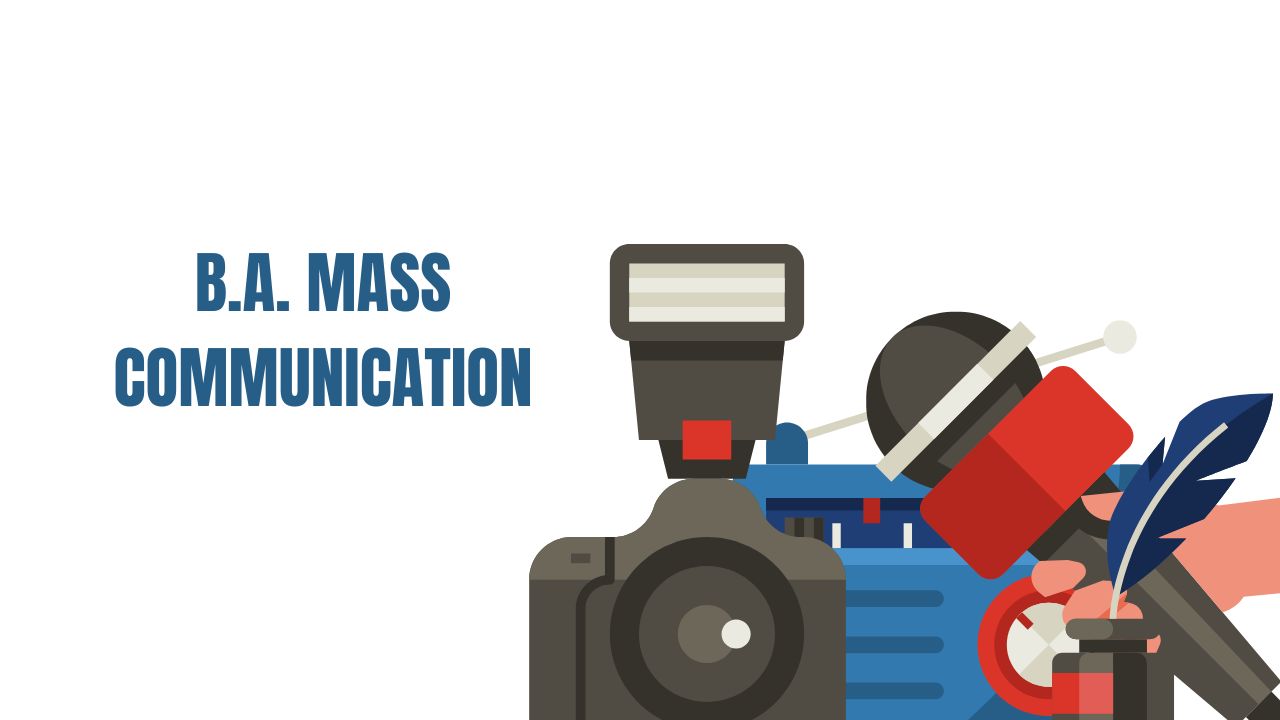Welcome to the exciting world of Mass Communication! This guide presents an in-depth exploration of this dynamic undergraduate degree. From outlining the curriculum to discussing career prospects, top recruiters, and pivotal internships, we aim to enlighten you on every aspect of your potential journey in this vibrant field.
The Blueprint: Unravelling B.A. Mass Communication

The B.A. (Bachelor of Arts) in Mass Communication or B.A.(Hons) in Mass Communication is a dynamic three-year undergraduate course designed to provide aspiring media professionals with an in-depth understanding of journalism and mass communication.
It covers a broad spectrum of media platforms, including:
- Television: In the realm of television, B.A. (Hons) Mass Communication students learn to produce, direct, and edit various types of TV content, understanding the intricacies of visual storytelling, audience analysis, and broadcasting standards, all while adapting to the rapidly evolving landscape of digital television.
- Radio: The course guides students through the unique nature of radio as a medium. It emphasizes scriptwriting for radio, the nuances of audio production, understanding radio’s immediacy and intimacy, and explores the dynamics of hosting live shows, with a strong focus on voice modulation and articulation.
- Newspapers: Students dive into the bustling world of newspapers, learning the art of news reporting and writing. They are taught how to critically evaluate events, conduct effective interviews, understand journalistic ethics, and work towards tight deadlines, thereby understanding the constant energy of a newsroom.
- Magazines: Covering the magazine industry, the course teaches students about feature writing, magazine layout design, and audience segmentation. They learn to craft engaging content, from lifestyle to business topics, and understand the importance of visual elements that make a magazine aesthetically pleasing.
- Cinema: Within cinema studies, students analyse film as a powerful medium of mass communication. They study film theory, screenwriting, direction, cinematography, and sound design. Students explore the cultural, social, and political implications of cinema, understand narrative structures, and the impact of cinema on audience perception.
and more.
Students are equipped with the necessary skills to disseminate information effectively, mastering the art of connecting with the masses.
Diverse Career Prospects: What Lies Ahead Post-Study

Upon successful completion of the course, a multitude of exciting job profiles beckon. Graduates can take on roles such as:
- Public Relations Officer: Mass Communication students are equipped with excellent written and verbal communication skills, a keen understanding of media relations, and strategic thinking abilities – all crucial for a role as a Public Relations Officer. They’re well-positioned to manage an organisation’s image, orchestrate public-facing campaigns, and build relationships with the media. In the future, they can progress to PR Manager or Director roles, or even establish their own PR consultancy.
- TV Correspondent: A TV Correspondent role involves live reporting, researching, and conveying news stories to a wide audience – skills that Mass Communication students have extensively trained in. They know how to present information in a compelling, accessible manner, making them ideal for this role. With experience, they could become Senior Correspondents or News Anchors, and may even transition to producing or other editorial roles.
- Film Director: The comprehensive understanding of visual storytelling, narrative structures, and audience psychology that students gain in a Mass Communication course is a strong foundation for a career in film direction. They’re taught to appreciate and create meaningful content, positioning them well for directing short films, advertisements, or even feature films. Over time, they can work on larger productions, partner with film studios, or establish their own production company.
- Reporter: Mass Communication students are well-equipped for a career in reporting, having honed their skills in news writing, interviewing, and ethical journalism. They are adept at sifting through information to identify newsworthy stories, making them suitable for roles in print, online, and broadcast journalism. Career advancement might include becoming a Senior Reporter, an Editor, or even a Bureau Chief, specialising in areas such as political or investigative journalism.
- Radio Jockey: Mass Comm students have a good understanding of radio as a medium, voice modulation, show hosting and scriptwriting. They also appreciate the immediacy of radio, making them excellent candidates for a career as a Radio Jockey. As they gain experience, they can host prime-time shows, become Programme Directors, or diversify into voice-over work for commercials or animation.
among others.
Embarking on such a career path presents an average annual salary ranging between 5 to 7 lakhs for freshers.
Top Recruiters: Landing Dream Roles in Leading Companies

Graduates in Mass Communication are highly sought-after, with leading companies such as IBM, Lenovo, HCL, Disney Entertainment, and Warner Brothers eagerly recruiting fresh talent.
These prestigious companies offer a stellar platform for graduates to apply their skills and carve their niche in the industry.
Course Eligibility: Laying the Foundation for Your Journey in Mass Communication
Aspiring students must possess a 10+2 or equivalent qualification from a recognised board, with an aggregate score of at least 55%. Candidates awaiting their 10+2 results can also apply, expanding the accessibility of this course.
Some institutions also require students to pass an entrance examination, further refining the selection process.
A Deep Dive into the Curriculum: Unveiling the Course Structure
The course curriculum, meticulously designed over six semesters across three years, builds a solid foundation in media practices. Students gain invaluable insights into the significant role of news media globally and receive in-depth knowledge of the media landscape.
Subjects encompass a mix of mandatory and elective choices, with a focus on the arts constituting around 40% of the course content.
Semester-wise BA (Hons) Mass Communication curriculum offered at SMS Varanasi are:
Year 1
First Semester
- BA(H)MC-22-101: Communication, Media & Society
- BA(H)MC-22-102: Introduction to Journalism
- BA(H)MC-22-103: Principal of Communication
- BA(H)MCME-22-104: Principles of Management
- BA(H)MCME-22-105: Cyber Security
- BA(H)MCVC-22-106: Graphic Design & Visual Image (Vocational Faculty)
- BA(H)MCCC-1: Food, Nutrition and Hygiene (Co-Curricular Course)
Second Semester
- BA(H)MC-22-201: Print Media Production
- BA(H)MC-22-201P: Print Media Production Lab
- BA(H)MC-22-202: Media History
- BA(H)MC-22-203: Public Relations
- BA(H)MCME-22-204: Advertising and Media
- BA(H)MCME-22-205: Management Information System
- BA(H)MCVC-22-206: Camera & Editing (Vocational Faculty)
- BA(H)MCCC-22-2: First Aid and Health (Co-Curricular Course)
Year 2
Third Semester
- BA(H)MC-22-301: Exploring Hindi Cinema
- BA(H)MC-22-302: Radio Journalism
- BA(H)MC-22-302P: Radio Journalism Lab
- BA(H)MC-22-303: Photo Journalism
- BA(H)MC-22-303P: Photo Journalism Lab
- BA(H)MCME-22-304: Organizational Behaviour
- BA(H)MCME-22-305: Business Environment
- BA(H)MCVC-22-306: Content Writing (Vocational Faculty)
- BA(H)MCCC-22-3: Human Values and Environment Studies (Co-Curricular Course)
Fourth Semester
- BA(H)MC-22-401: Development Communication
- BA(H)MC-22-402: Reporting and Anchoring
- BA(H)MC-22-402P: Reporting and Anchoring Lab
- BA(H)MC-22-403: Social Media
- BA(H)MCME-22-404: Marketing Management
- BA(H)MCME-22-405: Data Mining
- BA(H)MCVC-22-406: Digital Marketing (Vocational Faculty)
- BA(H)MCCC-4: Physical Education and Yoga (Co-Curricular Course)
Year 3
Fifth Semester
- BA(H)MC-22-501: Television Journalism
- BA(H)MC-22-501P: Television Journalism Lab
- BA(H)MC-22-502: Writing for Media
- BA(H)MC-22-503: Communication Research
- BA(H)MC-22-503P: Communication Research Lab
- BA(H)MC-22-504: Global Politics and Media
- BA(H)MCCC-22-5: Analytical Ability and Digital Awareness (Vocational Faculty)
- BA(H)MCRB-505: Internship (Co-Curricular Course)
Sixth Semester
- BA(H)MC-22-601: Documentary
- BA(H)MC-22-601P: Documentary Lab
- BA(H)MC-22-602: Alternative Media
- BA(H)MC-22-603: Integrated Marketing Communication
- BA(H)MC-22-604: Media Management
- BA(H)MCCC-22-6: Communication Skill and Personality Development (Vocational Faculty)
- BA(H)MCRB-22-605: Dissertation (Co-Curricular Course)
Internships: Bridging the Gap Between Theory and Practice
In the final year, internships provide students with practical exposure, facilitating the transition from theoretical learning to the application of skills in real-world settings. These internships offer a unique opportunity to gain hands-on experience, enhancing their industry understanding and readiness for their future career.
In conclusion, the B.A. in Mass Communication course serves as the launching pad for an exciting career in the media industry. By mastering the art of mass communication, students are poised to make a significant impact in the dynamic world of media and journalism.





